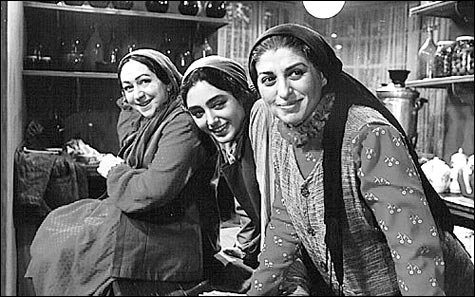
The Fish Fall in Love |
“Where we come from we have a saying: ‘If you live in hell long enough, you get used to it.’ ” That’s Mohammed Harba talking about his former life in Iraq, under Saddam Hussein’s dictatorship. Harba never thought he’d be a free man, living in a democratic society. He only dreamed of such an existence. When he was chosen to come to America on a Fulbright scholarship, in 2005, that all changed. Since moving to Boston, Harba became the first Iraqi Muslim to study the Holocaust at Hebrew College, and is now considered an expert on modern Arabic cinema (particularly the depiction of female characters), which he currently teaches as part of the first-ever Arabic class at Philips Andover Academy.
Harba’s latest venture is another first, and one that, as an aspiring filmmaker and a former oppressed Iraqi, is near and dear to his heart: curating the Boston Muslim Film Festival. Running April 14 through 30 and co-sponsored by Boston University’s Women’s Studies Program, Americans for Informed Democracy, and the American Islamic Congress, the debut event is focusing on “Think-Different Women,” in which the themes of women’s equality and free expression are expounded.
“We tend to forget women in that part of the world,” says Harba. “As a refugee from Iraq, I know how hard it is to stand up and call for different things, to demand change. This film festival is not about criticism; it’s about hope — that we can someday create a civil-rights movement in the Middle East.”
The festival will spotlight five films, all of which, according to Harba, celebrate independent women on the front lines of reform — women who challenge extremism and social taboos.
One selection, Mrs. President, produced by Boston University Women’s Studies professor Shahla Haeri, profiles six dynamic Iranian women who, in 2001, dared to register as candidates for president in Iran, only to be disqualified by the Guardian Council there. (Haeri will speak following the showing.) Another, Shadya, a coming-of-age portrait, features Shadya Zoabi, a 17-year-old world champion in karate and a Muslim Arab living in the Galilee, a large region in Northern Israel.
“The characters in this festival represent heroes who try to say something different and remind people of the real Middle Eastern Muslim world, a culture and civilization that have nothing to do with segregation and oppressed women,” says Harba, who views the festival as a way to defy stereotypes as well as a vehicle to give a voice to the voiceless. “When you experience living without a voice, you can understand how frustrating and sad it is that nobody is listening to you, and I wanted to make these voices heard.”
All screenings, held at local college campuses, April 14 through 30, are free and open to the public. For event details, including screening information, see listings in the Arts section, or visit muslimfilm.org.